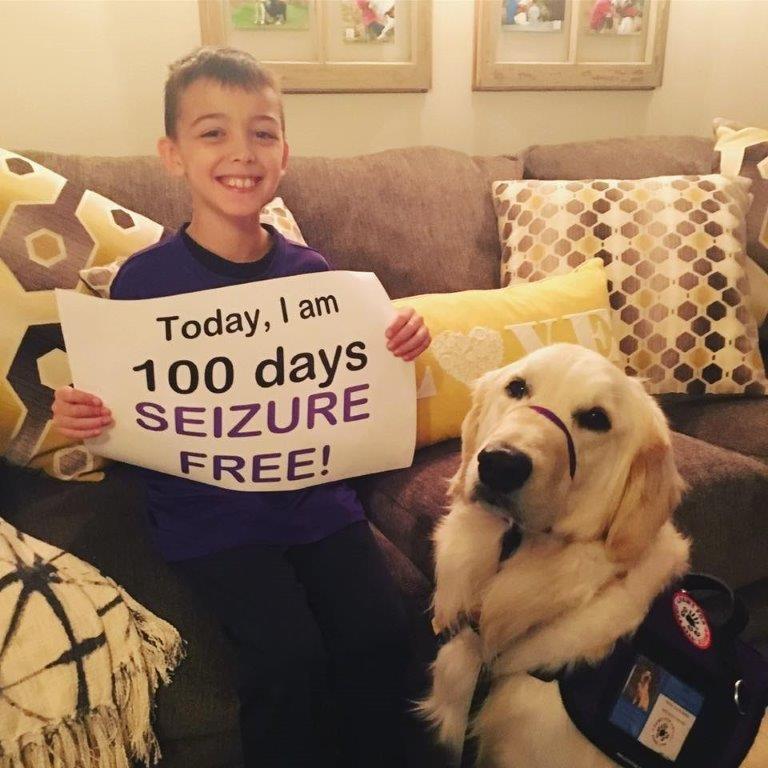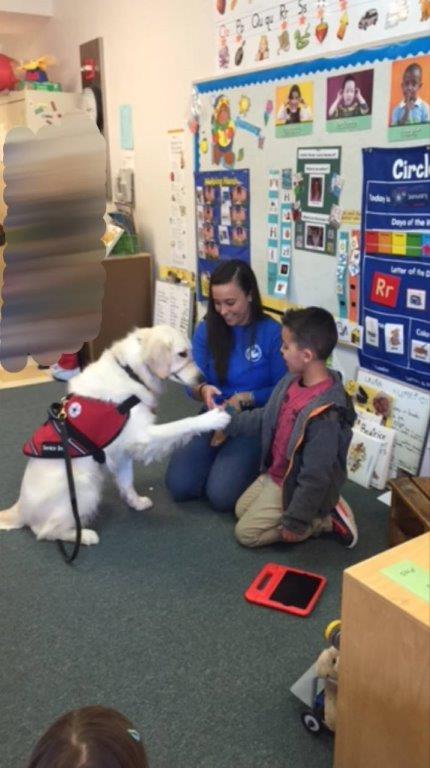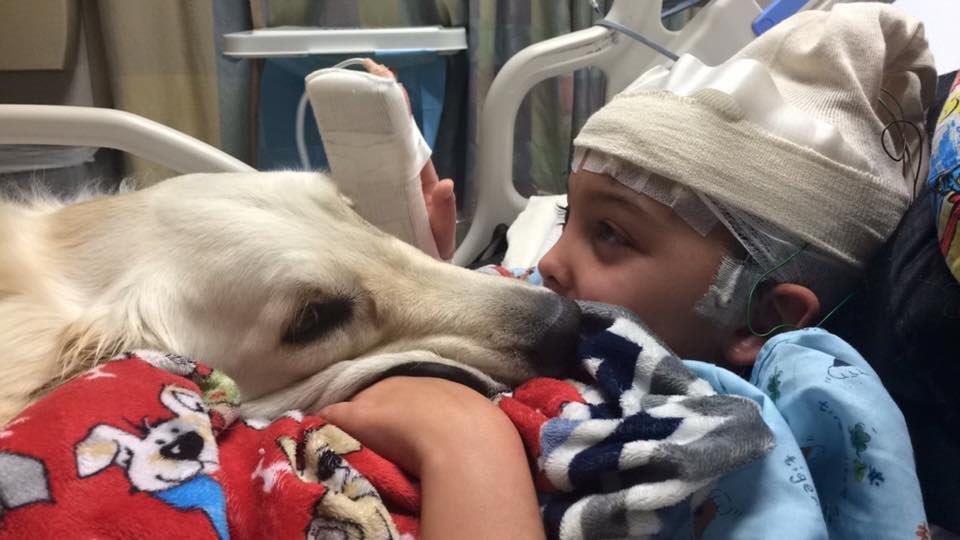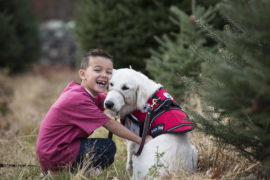


A Dog Worth Fighting For: The Story of Austin and Paris
Along Came Paris
Watching Paris, a 3 ½ year old Golden Retriever, gently interacting
with her companion, nine-year-old Austin, you see the beautiful bond
between them.
Ericha, Austin’s mom says, “It’s clear that they were meant
for each other. They had an instant connection. Paris was a complete
godsend.”
With her buttercream coloring, soulful dark chocolate eyes and the
temperament of an angel, it’s hard to believe this seizure alert dog was
the subject of a dispute between her family and the local school
district.
Their battle to keep Paris by Austin’s side while at school even made
the local news in Franklin, Massachusetts.
This is their story.
Austin is a typical third grade boy. He loves Star Wars, Mario
Cart and Legos. Austin would play video games all day if he could, and
he’s certain his vocational calling is to be a gamer when he grows up.
But unlike most children his age, Austin has a seizure disorder
resulting from several rare brain malformations. For years it caused
him to have global seizures and 1-2 grand mal seizures a month.
Austin’s mom, Ericha, says the seizures were frightening, especially
when they would happen during the night.
“I would only know if Austin was having a seizure in the night if he
was sleeping with me in bed,” says Ericha.
“I was afraid not to be around him because I knew of all the bad
things that could happen if the seizure would last too long. Even
though I was prepared, and knew the correct response, I would feel
panic when a seizure happened.”
When someone suggested she look into a seizure alert dog, Ericha
became hopeful and excited. A dog would alert to Austin’s seizures,
giving them a chance to respond more quickly and minimize any
negative effects.
Ericha’s initial concern was finding an organization that would place
a dog with Austin, since he was only six years old at the time.
“We found 4 Paws for Ability in Xenia, Ohio, and they were willing to
work with us, as long as an adult was physically in control of the dog at
all times,” says Ericha.
“I learned of Canines For Disabled Kids when we began raising funds
for the cost of Austin’s dog.”
Canines for Disabled Kids supports service dog partnerships for
children, including those under age 12, who often don’t qualify for
service dog programs.
Through their scholarship programs and educational outreach,
Canines for Disabled Kids helps children with deafness, autism
spectrum disorders, mobility challenges and other disabilities increase
their independence.
Canines for Disabled Kids helped Ericha in many ways, the first being
awarding a scholarship to help defray the expense of obtaining a
service dog for Austin.
Helping with a Diagnosis
Paris and Austin bonded immediately, but more importantly, she
began alerting to seizures all the time.
“The doctors and I did not know Austin was having near constant
seizures. We thought they were mostly happening at night, but Paris
was alerting us all the time,” explains Ericha.
“We had additional testing done and it turned out, Paris was right.
Austin’s seizures were subclinical, deep in his brain, and so we weren’t
aware of them.”
“Paris smelled the chemical change and began alerting us by licking
him. She only licks him when there is a chemical change, indicating a
seizure is about to happen. If he is having an active seizure, Paris will
bark. Those are the only times Paris will lick or bark.”
Ericha adds that because Paris was so intent on alerting to Austin’s
seizures, from the first day they brought her home, that she helped the
doctors diagnose and treat his seizure disorder.
In the last 2 ½ years Austin has been doing really well, and has been
free of seizures for over 100 days, as of this writing!
“I really can’t say enough about Paris. If she hadn’t alerted us to the
subclinical seizures that we didn’t know Austin was having, who knows
how long we would have been dealing with this, and not effectively
treating his seizure disorder.”
A Dog Worth Fighting For
Because Austin was having seizures constantly, and they were
interfering with his daily activities, Ericha wanted Paris to accompany
Austin to school.
Paris could possibly save Austin’s life.
Unfortunately, the Franklin School District put up a fight, saying that
according to ADA (American’s with Disabilities Act) they had no
responsibility to care for or feed a service animal.
The district told Ericha that she could either hire a handler or be
Paris’ handler herself. Neither option was financially feasible for Ericha,
a single mom.
“I was so upset, trying to explain to them that a seizure alert dog is a
medical alert dog. I couldn’t understand why they couldn’t see how
Paris was a lifesaving benefit for Austin. She would also benefit the
staff who would have to tend to Austin, and potentially spare the other
children from witnessing a scary medical event.”
The school district brought a lawyer to a meeting, which Ericha felt
was meant to intimidate her, but she wasn’t backing down.
Support from Canines for Disabled Kids
That’s when Kristin Hartness, The Executive Director of Canines for
Disabled Kids stepped in.
“Kristen came with me to meet with the school district,” says Ericha.
“Kristin has a great knowledge of ADA and how the law applies to
service dogs. She explained to the school district that just because the
law says that a school district doesn’t have to provide care for a service
dog, that doesn’t mean that it can’t provide care.”
“With Kristin’s vast knowledge of the law and how it pertained to
service dogs, we made some progress with the school. Kristin educated
them. They had a greater understanding of the law and our position,
but they still didn’t want to budge.”
Ericha continued to advocate for Austin. “I was not about to give up.
Austin had a one-to-one aide…if she could push him in a wheelchair,
why couldn’t she hold Paris’ leash?”
Ericha took Austin and Paris’ story to the local news media who
featured their story on television.
“Again, Kristin Hartness and Canines for Disabled Kids really went to
bat for me,” Ericha explains. “Kristin guided me through the process of
talking with the media. She helped me educate the reporter and the
public on what the laws were and why we were asking for them to
provide a handler for Paris to attend school with Austin.”
“I owe a lot to Kristin because she taught me how to effectively and
professionally talk to the media so that there was no negative backlash
to our family.”
After the story aired, Ericha received great public support for her
cause, and the school district eventually decided to hire a dedicated
handler for Paris.
Kristin met with the school staff to coach them on how to integrate a
medical alert dog into the school day. She also met with the students,
explaining what a service dog does and how they could and could not
interact with Paris.
Now Paris accompanies Austin to school every day. Paris alerts to
Austin’s seizures and, when seizure medications were making him sick,
she helped him walk.
Without Paris by Austin’s side with a special harness, Austin would
have needed a wheelchair.
Words are not Required
In addition to seizures, Austin’s brain malformations cause him to
have a severe speech delay. His speech is muffled and often difficult
for others to understand. A communication device helps, but Austin
would prefer to use his mouth to speak like other children.
Ericha says that Austin gets very frustrated when people can’t
understand him. Paris is also trained in behavior disruption. When she
senses Austin’s frustration growing, she will put her paws on his lap to
remind him to refocus.
If Austin is still struggling to remain in control, Paris will put her
head on his lap so that he can pet the smooth hair on her head, which
instantly helps him relax. With the command “over” Paris puts her body
weight on Austin, as a form of deep pressure stimulation to help him
calm down.
“We use that command quite often at school,” says Ericha. “Paris is
like Austin’s live weighted blanket.”
When Austin can’t speak, or isn’t speaking the way he wants to,
Paris’ gentle touches show Austin that sometimes words are not
required.
Momma Dog
“Paris has improved our lives in so many ways, I can’t even count
them. I can’t even remember what life was like before her…she has
brought so much joy and security into our lives.”
“Because of Paris, Austin has the independence of sleeping in his
own bed. Austin can play with his friends at the playground or
participate on a sports team with Paris a few steps away. I don’t have
to hover over him.”
Of course Ericha is nearby, but it is definitely much cooler to have
Paris by his side as he romps with the other children.
Ericha laughs, “We call her Momma Dog. She’s like his second
mother. She is always watching him, just so naturally in tune to what
he is doing. They have so much fun together.”
“Austin loves to wear costumes of his favorite characters and we
dress Paris up too. She’s been Princess Leia from Star Wars a few
times. They both dress up for Spirit Week at school. Paris even gets
her picture with Austin on school picture day.”
Thanks to Ericha’s standing up for her son’s needs, with the help of
Kristin Hartness and Canines for Disabled Kids, Austin and Paris will be
attending school together for many years to come.
Ericha has advice for other families facing challenges with their
child’s service dog.
“Go with your gut and don’t stop fighting for what you believe in. It
would have been very easy for me to listen to the school district and
not send Paris to school with Austin. But, if I hadn’t fought for Paris to
be there, she wouldn’t have figured out that he was having seizure
activity all day. Stick to your guns and be an advocate for your child.”
And if you’re lucky, you’ll have an organization like Canines for
Disabled Kids in your corner, helping you help your child live the most
independent life possible.
By Janis D. Gioia
~ Janis Gioia special education teacher who writes for organizations
supporting children and adults with disabilities and mental health
challenges. Her website, www.comfortinganxiouschildren.com offers
articles and resources to help children with anxiety and autism
spectrum disorders.
Seizure Alert
photo credit: Michael Stone Portraits













